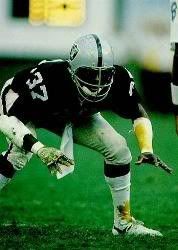7 Wishes wrote:Find me ONE piece of legislation initiated and enacted by Republicans that trumps a similar Democratic proposal that shows a higher degree of empathy for his or her fellow man, from the past 50 years, and then get back to me.
Easy....Welfare reform in 1996. Democrats were all for continuing to impose their "empathy" on those without jobs and keeping them feeling useless and directionless and on the government tit. Until that is those evil republicans forced them to actually work and reduce the child poverty rate.
http://www.boston.com/news/globe/editor ... m_success/Welfare reform success
By Jeff Jacoby | September 13, 2006
LILLIE HARDEN was a 32-year-old mother of three from Little Rock, Ark., when Bill Clinton met her at a panel on reforming welfare in 1986. Harden had collected welfare for two years before finding work and had come to speak about her experience. Clinton asked her what was best about being off welfare. Her reply: ``When my boy goes to school and they say, `What does your mama do for a living?' he can give an answer."
Ten years later, when Clinton was in the White House, he invited Harden to join him as he signed the Personal Responsibility and Work Opportunity Reconciliation Act of 1996 -- welfare reform -- into law. In his remarks, Clinton recalled her answer of a decade earlier, and added: ``I have never forgotten that."
For all that Clinton got wrong, welfare reform was one thing he ended up getting very right. He had vetoed two previous reform bills passed by the Republican-controlled Congress, and when the House and Senate came back with a third bill, liberal pressure for another veto was intense. But political strategist Dick Morris warned Clinton that a third veto could cost him the 1996 election, and so, pronouncing it a ``historic opportunity to do what is right," he signed the bill.
The chorus of outrage from the left was deafening. Marian Wright Edelman, chairman of the Children's Defense Fund, warned that Clinton's signature would ``leave a moral blot on his presidency and on our nation." Senator Patrick Leahy of Vermont denounced the bill as ``anti-family, anti child, and mean-spirited." Hugh Price, head of the National Urban League, declared that ``Washington has decided to end the War on Poverty and begin a war on children." Over and over it was said that welfare reform would wreak social devastation, throwing vast numbers of people, including a million children, into poverty.
Peter Edelman, the husband of Marian Wright Edelman and an assistant secretary of health and human services, resigned in protest and condemned the new law in a long article -- ``The Worst Thing Bill Clinton Has Done" -- in The Atlantic. It predicted, among other things, ``more malnutrition and more crime, increased infant mortality, and increased drug and alcohol abuse . . . increased family violence and abuse against children and women." He concluded, this ``terrible legislation" would do ``serious injury to American children."
It did none of those things.
What it did do was end the condescending attitude that the poor were incapable of improving their situation, and that ``compassion" consisted of supplying money indefinitely to women who had children, but no husbands or jobs. That approach had lured millions into lives of dependency, subsidized an explosion of fatherlessness, and infected neighborhoods with a bias against work and marriage. The bill that Clinton signed replaced deadly condescension with respect. For the first time, welfare would come with strings attached: work requirements and time limits designed to encourage responsibility and self-sufficiency.
The results speak for themselves. Since peaking in 1994, the nation's welfare caseload plummeted by 60 percent, falling from 5 million families to fewer than 2 million. Welfare recipients went to work in droves. The employment rate among those who had been likeliest to slip into long-term dependence -- young mothers who had never been married -- soared by nearly 100 percent. And as more and more mothers left welfare and got jobs, more and more of their children were lifted out of poverty.
Far from throwing a million kids into the streets, welfare reform sent the child poverty rate tumbling, from 20.8 percent in 1995 to 17.8 percent in 2004. In black communities, where welfare had done the most damage, the decline was even more dramatic. ``Black child poverty plummeted at an unprecedented rate, falling to 30.0 percent in 2001," Robert Rector of the Heritage Foundation testified before Congress . ``In 2001, despite the recession, the poverty rate for black children was at the lowest point in national history."
Not everything has been reformed. The 1996 law affected only the basic welfare program, Aid to Families with Dependent Children. But dozens of other welfare entitlements, such as food stamps and Medicaid, still operate under the old rules. And while the out-of-wedlock birth rate is no longer skyrocketing, it is still far too high -- as are the poverty and social chaos it begets.
That said, it is clear that welfare reform has been a shining success. The Republican Congress that passed it and the Democratic president who signed it turned out to be truer champions of the poor than those who inveighed against it so hysterically.



